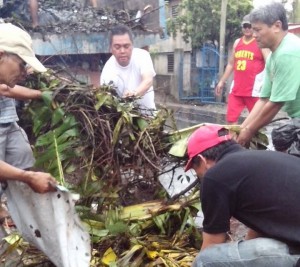Typhoon Glenda: A Great Awakening. By Greg Castilla

It was late Tuesday afternoon, July 16, when the rains started to fall with increasing frequency. The warning had been aired over the various radio stations: “Glenda,” packaging maximum winds of about 150 kilometers per hour, would make a landfall between Albay and Sorsogon that evening. Truth to tell, I was not scared. However, I was nervous.
I was not scared because, as a child growing up in Sipocot, typhoons conjured up visions of family praying together, feasting on sardines under the cover of darkness, listening to my mother tell stories, and sleeping through the night with my ‘yaya,’ who was more than a mother to me,
In a sense, typhoons brought our family together. They also taught us to rely on one another, especially during difficult times.
The morning after every typhoon was a different story though. The story was oftentimes heart wrenching; sometimes tragic. But what is etched in my mind is the memory of my parents inundating us with family rituals that ranged from sleeping together to praying together.
Since I left the Philippines more than 30 years ago, I have never experienced a typhoon with devastating consequences. So I thought that “Glenda” would trigger some memories of my childhood that might – or might not – bring to life yet again some significant family experiences that could provide succor when Mother Nature would eventually unleash its force.
I was at the same time nervous because I could already anticipate the potential swath of destruction that “Glenda” was capable of.
True enough, as “Glenda” pummeled our house with its gusty winds, I could feel our house tremble. The sound of the howling winds made me think I was in a war zone. I was terrified. I looked out of the windows and it was complete darkness. I did not know what to do. It must have been around 9:00 o’clock in the evening. I asked myself, “How long will this last?” There was no answer.
I thought I was ready for “Glenda,” but I was not. Typhoons were a way of life for me as a child, but not this one. In an instance, Mother Nature was in command and not me. I felt I was in “Glenda’s” mercy.
Since I could not sleep, I would routinely walk around the house, flashlight on hand, to look for damages. I noticed the rainwater started to enter through the sliding windows in the living room down to the floor – nothing, I thought, compared to the ordeal that many Bikolanos were going through that night.
Not knowing what was going on in other parts of the city, I texted my brother, my cousin, and a couple of friends.
My brother described his situation as under control. My cousin said his family was safe; nothing to worry about. All of my friends were in good shape, except for two who, because their floor was blanketed with water, had to sleep on a table, with their feet supported by chairs.
What a relief to know that people close to me were safe.
It was almost 12:00 midnight when “Glenda” finally ebbed. I was hoping that “Glenda’s” fury would not cause much destruction. But I knew that I was not being realistic. I was in denial.
I finally hit the sack; mentally tired.
When I woke up early Wednesday morning, the sight of uprooted trees, dangling tree branches about to fall, toppled electric posts and the desperate looks of those who lost parts of their homes are enough to make me cringe and question the very essence of my belief in the absolute Goodness.
But the few victims that I talked to that morning took what happened to them lightly, to my chagrin. Some even cracked a joke saying, “Glenda was a big success.”
I must have been away from Bikol for so long. I have already forgotten that typhoons have been a way of life for many Bikolanos. Typhoons may break their homes, but never their spirit, their hearts, or their faith.
“Glenda” was a great reawakening for me.










Leave a Reply